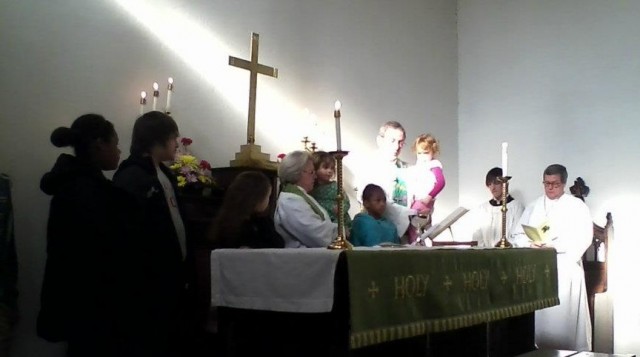In third of a series at Grow Christians entitled “the Pew Whisperer, ” Episco-blogger Derek Olsen explores faith formation by drawing upon his own experience of learning the ins and outs of football from his dad.
Writes Olsen; “It’s not that I don’t like football, it’s just that I don’t normally spend the time to watch it. I certainly don’t mind watching our hometown Baltimore Ravens play, but it’s not a habit of mine. I never played football. When I hit the weight rack at our gym today you can still tell who were the guys playing football in high school and college, and who was the guy playing Dungeons & Dragons.
But my father did play. He grew up in Texas in an era where football was a masculine rite of passage. Growing up, we would only watch a few teams—the Cowboys and the Browns, Ohio State and the University of Texas—but when we did, my dad would explain what was going on to my brother and me. He didn’t think that we’d ever use this knowledge to become star players; my father viewed this as a form of cultural literacy. As he saw it, part of being a guy is being able to talk sports with other guys and to understand the game even if it wasn’t a passion of ours. And—sure enough—his lessons have stood me in good stead over the years. Now I find myself passing them on to my daughters to the puzzlement of my wife (who knows exactly how little football I watch).
Did my dad enjoy having his football game interrupted by questions from us about what was happening or why he knew something? Probably not. There was probably a stretch of years where he couldn’t properly focus on the game because he would have to be constantly explaining things to us. But he didn’t complain about it: in his eyes, it was a duty, an important transfer of knowledge.”
Olsen then draws a parallel with the task of teaching our children the importance of faith and liturgy and helping them understand whats happening and why. That just like his dad putting up with being interrupted while watching the game; its a valuable investment of time on our parts to sacrifice a few years of distracted worship to pass along our faith tradition.
“Yes, there may be a stretch of years where we as parents can’t worship with uninterrupted focus—but that’s ok. We are playing an important role in transferring cultural literacy to our children: valuable insights into why we’re Christian, what the liturgy and the faith mean to us, and why we feel it’s important to pass it on to them.”
Olsen wonders though, if part of our reluctance to undertake this work is because we may not feel knowledgeable enough ourselves.
“But—and here’s the kicker—this means that we have to know ourselves… We have to know what’s going on. We have to know why we’re doing what we’re doing in church, and how the things in the liturgy connect and play out in our daily lives. Sometimes, I think, we don’t want to take the time to explain things because it’s an interruption—but maybe it’s because we don’t know ourselves.”
And if that’s so, then here’s your challenge – go find out
“Talk to your priest. Talk to your Christian Formation or Sunday School people. Can they do a class on what the liturgy means? For you—not just for your kids. And have you taken the time to stop and consider and to work out why and how this stuff matters?
That’s my challenge to you: be informed so that you are able to inform. Know why this stuff matters so you can communicate to your kids why it matters. If you’re a priest, make sure your people know. Christian Formation isn’t something that happens in Sunday School classrooms to children of a certain age; it must be the whole Body of Christ building itself up together into the wisdom and the love of God.”
image: by Jon White

